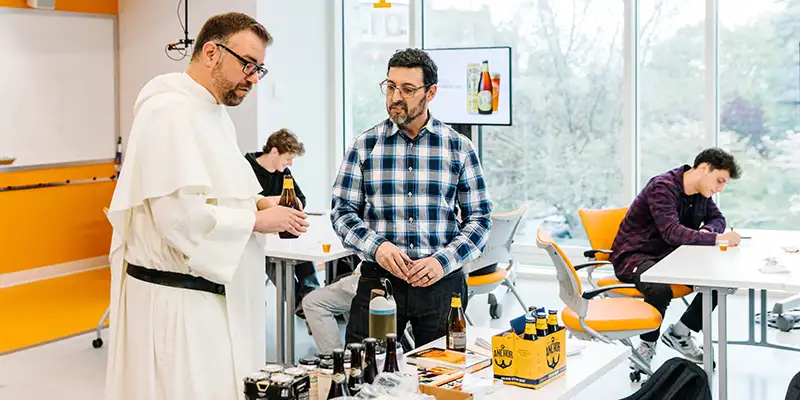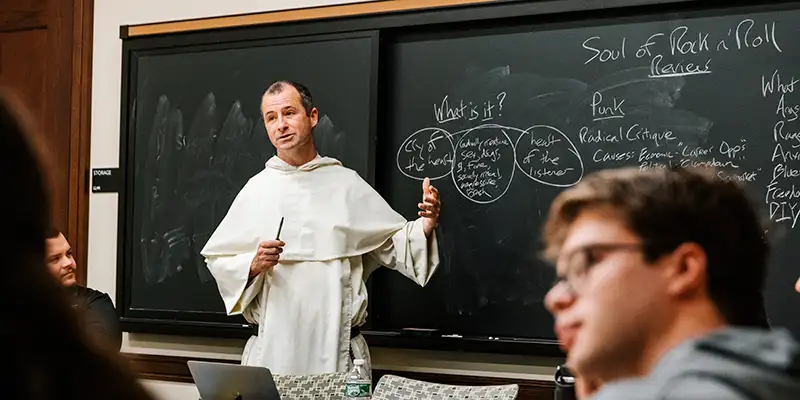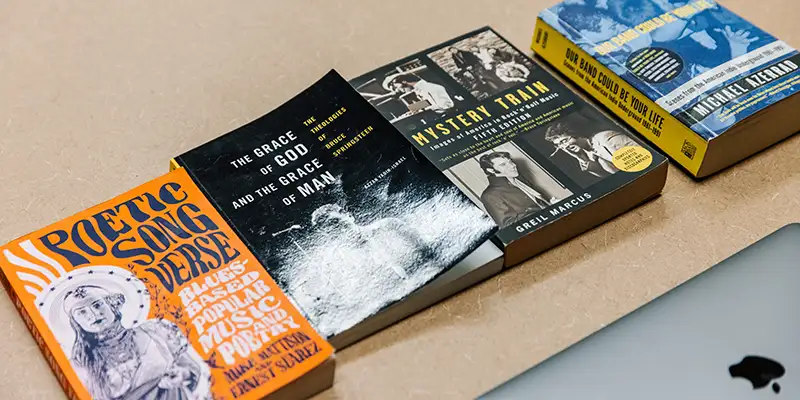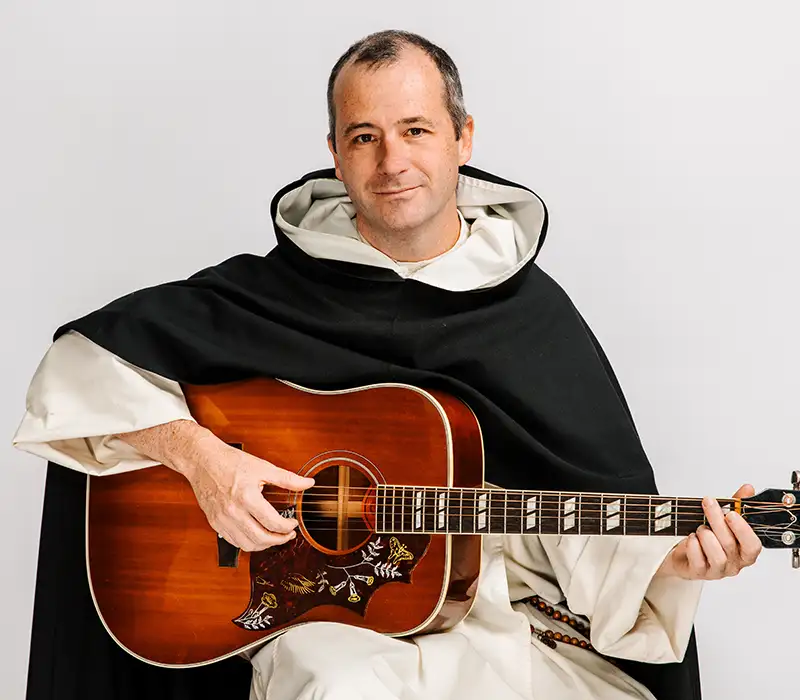Textbooks, beer, and rock and roll
The Providence College Humanities Program offers “courses outside of the ordinary”

By Michael Hagan ’15, ’19G
If college students told you they had beer and rock and roll on their schedules, you might assume those were weekend plans. But through the Providence College Humanities Programs, students may complement their academic schedules with one-credit courses on topics that include stargazing, the films of Alfred Hitchcock, and yes, Beer and the Soul of Rock’n’Roll.
The courses meet once a week and engage serious discussion about matters such as the intersections of sense and reason, deepening students’ appreciation and critique of art, craft, and familiar cultural phenomena. They broadly consider what it is to be a person in a physical world, delighting in the creative work of God and of human beings.
Humanities 250: Beer
Rev. Jordan Zajac, O.P., Ph.D. ’04, assistant professor of English, sometimes surprises people when he tells them, “Too often, college students don’t enjoy beer enough.”
As a doctoral student at the University of Massachusetts Amherst, Father Jordan wrote his dissertation on the social significance of eating and drinking in English Renaissance drama. In his leisure time, he lived that significance at the Moan and Dove, an Amherst pub serving more than 200 varieties of beer, where he gathered with friends and made new ones.
It was a different experience than his undergraduate years, when Father Jordan and classmates drank from metal kegs barely chilled by half-melted bags of ice set atop haphazardly. The frothy yellow liquid spouting from often dirty taps filled flimsy plastic cups mostly with foam. The unpleasant pour would become unpalatable if not consumed in haste. This was all there was to beer, he assumed.
Over a meal at the Abbey on Admiral Street, he had an epiphany in a bottle of Magic Hat #9.
“Magic Hat changed the way I thought about beer,” Father Jordan said. “I began to enjoy different styles of beer with friends. I came to appreciate the rich history of brewing. I better understood scenes in early modern dramas I studied in which taverns were places of community and discussion of friendship, politics, faith — things that matter. There’s equality in the tavern; patrons drink the same beer.”
When he joined the English faculty at Providence College, he met Jay Pike, Ph.D., assistant professor of chemistry, a member of the American Society of Brewing Chemists, and a recipient of the Craft Brewing Certificate at Johnson & Wales University. Pike had already integrated his love of brewing into The Scientific Chef, a course designed for non-science majors about the chemistry of food in general. His development of these courses coincided with explosive growth in the craft brewing industry in Rhode Island. As a chemist, Pike experimentally determines aspects of beer quality, such as bitterness, alcohol-by-volume, and oral tribology — a physical property frequently termed “mouthfeel” in tasting circles.

Brewing is chemistry, but beer was not invented in a lab.
“People have been brewing since before recorded history, and for most of that time, they had no idea what yeast even was. They literally thought beer just came from God. Fermentation was a miracle,” Pike said. “Beer has been so important throughout history that there are recorded laws associated with it. For example, in the Babylonian Empire, the Code of Hammurabi included laws against overcharging for beer. Exploit this and you could be punished by death.”
When the Humanities Program began offering one-credit courses on special topics, Pike and Father Jordan proposed an interdisciplinary course teaching students to enjoy beer rather than abuse it. Weekly course meetings take the form of tastings in which students older than 21 evaluate beers using the Beer Judge Certification Program scoresheet. They discuss the traditions and craft involved in each style of beer sampled while tasting 1.5-ounce servings of several varieties.
“We’ve come a long way from students describing the beers simply as ‘crushable’ or ‘not crushable,’” Pike said.
Not every beer pleases every palate.
“Oh, my goodness! Why does it taste like that?” one student said with a puckered face after tasting Fort, a Belgian-inspired strong ale brewed with raspberry puree, produced by Dogfish Head Brewery in Delaware.
Graded coursework includes scoresheets and a midterm assignment in which students, mostly seniors, develop a beer menu for a graduation celebration. They write vivid and enticing 250-word descriptions of their selections that draw on vocabulary specific to brewing. Though taste always involves subjectivity, a goal of the course is for students to evaluate beers according to the objective standards of traditional styles.

This goal complements the broader goal of the seminar consistent with the humanistic aims of the Humanities Program — enjoying the uniquely human experience nearly universal across cultures of brewing and savoring beer and delighting in the community it brings together.
“God made wine — and beer — to cheer the heart,” Father Jordan regularly paraphrases from the biblical Psalms. Brewing and drinking beer is about appreciating created good, human craft, and community.
“Our goal has been to expand the palates of students regardless of their previous level of enjoyment and show them the cultural influence of various styles of beer. We are hopefully changing the perception of beer on campus, and we’ve had a blast doing it,” Pike said.
“An absolute blast,” Father Jordan agreed.
Humanities 275: The Soul of Rock’n’Roll

Providence College undergraduates read the famous words from Augustine’s Confessions: “Our heart is restless until it rests in you.” As a Dominican friar and chaplain, Rev. Justin Bolger, O.P., is committed to the pursuit of rest in God’s eternal love and to accompanying students in the same pursuit.
As a lifelong musician and appreciator of music, Father Justin is attuned to existential restlessness that is the very soul of rock and roll, a genre that draws on diverse musical traditions and defies simple definition.
“There is something more immediate about rock and roll than other genres,” Father Justin said.
Citing the Irish writer and critic John Waters, who fathered a child with the late Irish rock artist Sinéad O’Connor, Father Justin said, “Rock and roll is a cry of the heart coming from the songwriter — often in a Trojan horse of transgressiveness — decoded in the heart of the listener.”
In his 1963 song “Masters of War,” Bob Dylan warns, “You that build all the bombs, you that hide behind walls, you that hide behind desks, I just want you to know I can see through your masks.”
“Yet Dylan himself famously changes masks all the time, even today,” Father Justin said. “Rock and roll is rich with all kinds of irony.”
Masks and artistic irony respond to one of the great tensions in rock and roll, which Father Justin describes as “the problem of the poser, of the sellout — which is kind of a paradox. The authenticity that is rock and roll’s appeal is almost immediately swept up by a commercial machine that commodifies and sells it.”
“Kurt Cobain of Nirvana was deeply anxious about selling out. He worried his music was becoming too popular with fans who liked it but didn’t — maybe even couldn’t — know what it meant,” Father Justin said. “I met a first-year student wearing a Nirvana shirt at orientation. I asked her if she was a fan. She didn’t know who or what Nirvana was. She just liked the shirt — exactly what Cobain feared.”

Father Justin described how rock and roll reflects the characteristically American prioritization of individuality observed by 19th-century political theorist Alexis de Tocqueville.
“The American wants to be his own master,” Father Justin said in paraphrase.“ One way people do that is by throwing off certain shackles of authority, especially religion. But a problem with individuality is that, left to define ourselves, we become vulnerable to social pressure.”
And social pressure begets another of rock and roll’s great anxieties: conformity.
As a humanities course, The Soul of Rock’n’Roll navigates questions of authentic humanity and its expressions.
“Man is the question he asks about himself,” the theological existentialist Paul Tillich wrote in 1951. In that same decade in the American South and through Black migration to the North and West, traditionally African American styles of jazz, blues, and gospel were fusing with folk and country traditions into the style that would soon be labeled rock and roll. When the term was coined, its supposed novelty was controversial.
“What they call rock and roll now is rhythm and blues. I’ve been playing it for 15 years in New Orleans,” Fats Domino said in an interview in 1957. Domino, who died in 2017, is nonetheless regarded as a pioneer and founder of the genre.
Students enrolled in The Soul of Rock’n’Roll are graded on class participation and short assignments. Assignments mostly included album reviews. As a final project, students developed playlists around a theme and planned a radio segment for 91.3 WDOM, the college radio station, discussing the music in relation to that theme. Many students were able to broadcast their segments live from the WDOM studio in Slavin Center.

Father Justin is a member of the Hillbilly Thomists, a popular bluegrass band of Dominican friars with four studio albums. The band is committed to the belief “that the invisible grace of God can be at work in visible things.” He enjoys sharing original music with students and incorporates song into his priestly ministry. He will bring music to his ministry as the new Catholic chaplain for Brown University and Rhode Island School of Design while continuing to reside in the St. Thomas Aquinas Priory at PC.
He also enjoys sharing his favorite rock and roll albums, especially albums formative to his musical tastes in youth. Through the text Our Band Could Be Your Life by Michael Azerrad, Father Justin introduces students into the American indie scene of the 1980s and early 90s with bands like the Minutemen and the Replacements — bands that “none of the students have heard of.”
“A lot of students had never heard OK Computer by Radiohead. I’m happy and excited to introduce them to that and to other great albums from before their time,” he said.
A variety of 1-credit humanities seminars and 1- to 1.5-credit practicum courses are offered each semester to students of all majors. Offerings for the Fall 2024 semester include Civ (Taylor’s Version), taught by College Chaplain Rev. Simon Teller, O.P., which will “put the lyrics of Taylor Swift into conversation with the great books of the Western tradition.”





